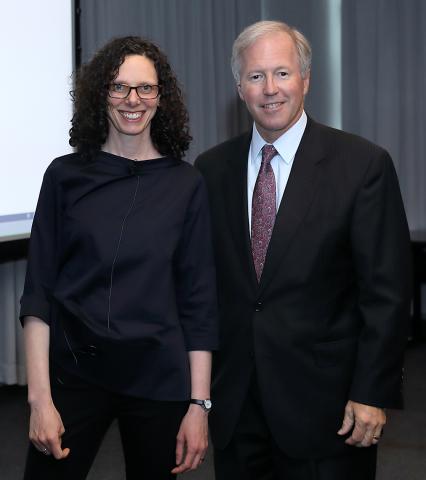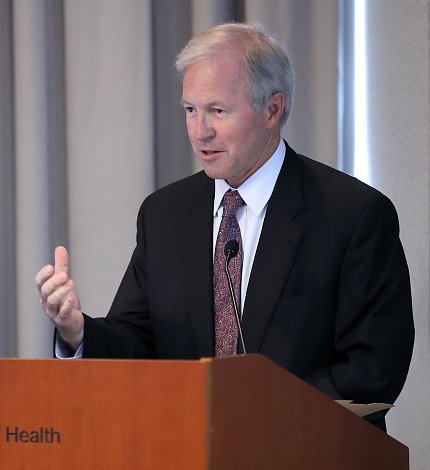Andrews, Roth Advocate for Decriminalizing Mental Illness

Photo: Chia-Chi Charlie Chang
Science is an integral part of the equation, as research continues toward new and improved medical treatments for people with mental illness. Another factor is how society cares for and protects them.
“We’ve made it a crime to have a mental illness,” said Alisa Roth, author of Insane: America’s Criminal Treatment of Mental Illness, who spoke at a recent NIMH Director’s Innovation Speaker Series lecture at the Neuroscience Center.
U.S. prisons are crowded with mentally ill people, a longstanding crisis within our criminal justice system that needs to change, argued Roth, who is currently a mental health reporter for Minnesota Public Radio.
The statistics are staggering. Half of all people in U.S. jails have a diagnosed mental illness, said Roth, adding that numbers are even higher among various demographics. This population is also less likely to make bail or parole, so they sit in jail longer.
“We have a jail population that’s harder to deal with, that’s more mentally ill,” concurred Phil Andrews, director of crime prevention initiatives for the State’s Attorney’s Office in Montgomery County, Md., who also spoke at the lecture. Overall incarceration numbers are declining in the county and nation, he said, while the number of people in jail with mental illness has substantially increased. Based on mental health assessments during booking, he said, the number in Montgomery County has doubled in the last 8 years.
Roth has interviewed prisoners, psychiatrists and law enforcement officials around the country and has witnessed vile conditions and flagrant abuses of the mentally ill during prison visits.
“This is not how we should be treating anybody, let alone the sickest and most vulnerable people in our society,” she said.
Ironically, though, the only people in this country with a constitutional right to health care are those in prison. “It goes without saying that there’s something truly wrong with a society [where] the only way you can guarantee getting health care is to get arrested,” said Roth.

Photo: Chia-Chi Charlie Chang
To illustrate her point, Roth shared the story of Edgar Coleman, a Minnesota man whose life had seemed promising. After a stint as a pro football player, he earned his master’s in psychology and taught in public schools and as an adjunct college professor. Coleman’s life took a turn in his mid-50s when he developed schizophrenia, possibly related to a brain injury from his football days. He couldn’t work, separated from his wife and became homeless.
Coleman began sleeping in stairwells at his alma mater, the University of Minnesota, where he sometimes helped himself to free food at lectures. From 1996 to 2012, Coleman was arrested more than 200 times, an average of an arrest a month for 16 years, for petty crimes such as trespassing and panhandling.
“Everybody involved in this story was trying to do the right thing: the person who called 911, the police who would pick him up,” said Roth, “but it really wasn’t doing much for him or the university to make things better. Because of people like him, we have turned the criminal justice system into our de facto health care system.”
Circumstances vary, of course, but there are many people out there like Coleman, doing hard time for low-level crimes. How will time in prison help the person get better, asked Roth, or help the person manage and succeed once released?
Part of the fix, argued Andrews, is a mental health court, which diverts offenders from prison to long-term community-based treatment. Almost every state has at least one. Maryland has several, including two in Rockville that began operating in 2016.
“In Montgomery County, we’re seeing an increased number of defendants come in who need mental health care and shouldn’t be languishing in jail,” said Andrews. Mental health courts offer an alternative.
“The strongest selling point to the public is that mental health courts improve public safety,” said Andrews, noting a significant reduction in repeat offenses after participants complete the program. “And they are definitely good for participants in helping them get back on their feet, become independent [and] lead more productive lives.”

Photo: Chia-Chi Charlie Chang
In Rockville, 30 of 103 participants have already graduated from the 12- to 18-month voluntary program, a statistic that will increase as remaining early participants advance and as the new program expands, said Andrews. The participant must have a diagnosed mental illness that contributed to committing the low-level crime. Not only do first-time offenders—who make up a significant portion of the mental health court participants—avoid jail time, but also they can avoid a criminal record by completing the program, which among other things improves their employment potential.
Additional pre-arrest diversion, as well as non-criminal justice system preventive solutions, are needed, said Andrews, including more mental health services, supported employment, supervised housing, additional beds in psychiatric hospitals as well as effective medical interventions.
Receiving good care doesn’t guarantee that a mentally ill person won’t commit a crime, said Roth. “But there are plenty of people who could have avoided ending up in the criminal justice system if they had gotten the care they needed.”
Jails could be less crowded. Resources could be better utilized. And people like Edgar Coleman could see their lives turn out differently, having every opportunity to be, and remain, productive members of society.
